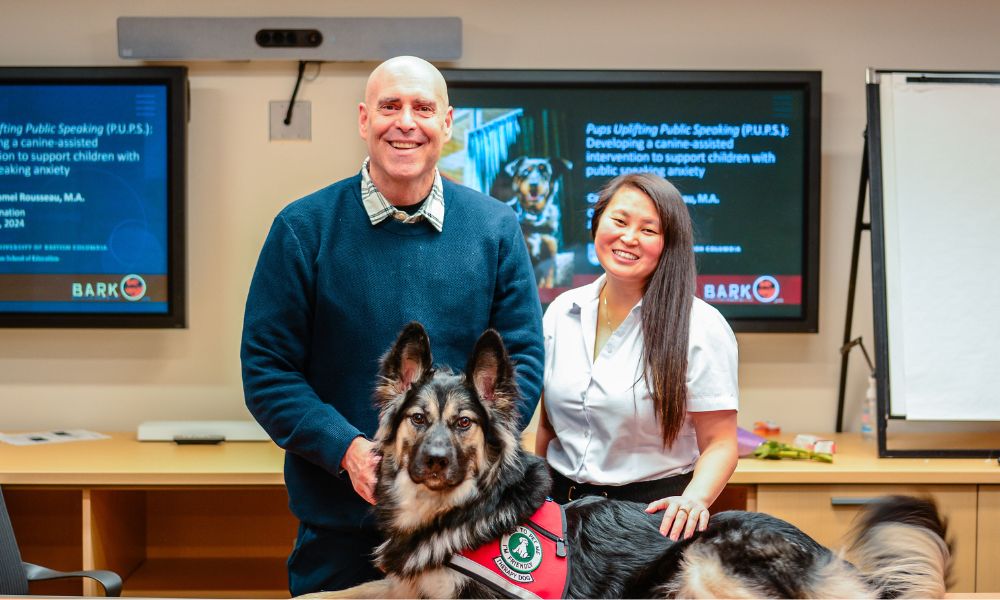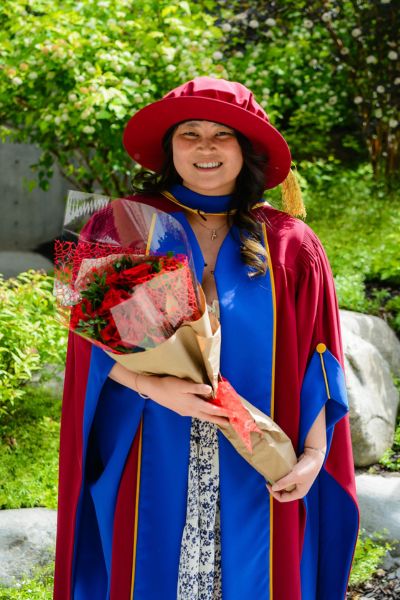
Dr. John-Tyler Binfet (left), Dr. Camille Rousseau (right) and Henry (dog)
From the nervous stutters to trembling hands, public speaking anxiety (PSA) is a common form of anxiety amongst people of all ages. Youth are particularly impacted by PSA, yet there have been limited interventions programs designed to support them.
Recognizing this gap, Dr. Camille Rosseau, PhD ’24, decided to explore this area in her dissertation. She conducted a series of studies to design and develop a canine-assisted public speaking pilot program specifically for grade 6 and 7 students who have PSA.
In her first study, she led focus groups with grade 6 and 7 teachers to learn more about the curriculum requirements around public speaking, what activities the students participated in and how the teachers supported their students who showed signs of PSA. She also interviewed students with PSA to understand how they experienced PSA in the classroom and what supports they leaned on. In her final stage of research, she surveyed dog handlers to learn what they thought researchers needed to consider when designing a therapy dog program for children.
“This study was the first to utilize a triangulated approach to incorporate teacher, student, and dog handler voices into the development of a research and practice informed canine-assisted intervention,” says Dr. Rousseau. “This helps ensure that the programming is mindful of educational and human-animal interaction considerations.”
Her findings from across the three studies informed the seven guiding principles developed for a pilot canine-assisted PS program, called Pups Uplifting Public Speaking (P.U.P.S.), for children with PSA.
“I hope this research can help us nurture diverse generations of young people that can actively and confidently participate in learning communities through clear communication and sharing of information,” she says. “This research forges ahead by exploring an innovative way to positively impact a developmental cornerstone of learning for our young leaders of tomorrow.”
Dr. Rousseau graduated earlier this year, and as she reflects on her academic journey, she emphasizes how the skills she’s gained have been are fundamental to the course and the success of her research career.
“It is only after starting my new research position that I have come to realize the extent of the skills I learnt at UBCO,” she says. “These include transferable skills pertaining to communication, organization, analytic thinking, critical thinking, computing, and writing, but also personal traits and attitudes such as independence, curiosity, integrity, fortitude, patience, and perseverance.”
***
 Dr. Camille Rousseau is a Postdoctoral Fellow in the Cardiovascular Health Promotion, Education, and Social Determinants Laboratory, within the Division of Cardiac Prevention and Rehabilitation at the University of Ottawa Heart Institute (UOHI). She is working with Dr. Karen Bouchard to explore research priorities in heart failure using a patient- and community-oriented approach.
Dr. Camille Rousseau is a Postdoctoral Fellow in the Cardiovascular Health Promotion, Education, and Social Determinants Laboratory, within the Division of Cardiac Prevention and Rehabilitation at the University of Ottawa Heart Institute (UOHI). She is working with Dr. Karen Bouchard to explore research priorities in heart failure using a patient- and community-oriented approach.
On September 12, 2024, Rousseau received the School’s Doctoral Studies Outstanding Dissertation Award for her dissertation titled, Pups Uplifting Public Speaking (P.U.P.S.) : developing a pilot canine-assisted intervention to support children with public speaking anxiety, which can be found on UBC’s cIRcle.
“This award acknowledges the work and the effort it took to conduct a research project with three different qualitative methods and to analyze the data within and across all three studies, whilst maintaining outstanding research quality befitting of a UBC graduate,” she says.
“Equally, receiving the award evidences the incredible support I received by my #1 cheerleader and supervisor, Dr. John-Tyler Binfet, the wonderful B.A.R.K. Coordinator, Freya Green, the B.A.R.K. student volunteers, dog-handler teams, my supervisory committee (Dr. Aisha Ravindra, Dr. Margaret Macintyre Latta, Dr. Scott Douglas, and Dr. Christine Tardif-Williams), and the OSE.
I also recognize that it is very humbling to be acknowledged by the Outstanding Doctoral Studies Award, particularly as the OSE had three students complete distinguished doctoral dissertations within the same year. Equally deserving of this award, I must acknowledge Dr. Jody Dlouhy-Nelson’s research on pre-service teachers’ perspectives on decolonizing and indigenizing learning spaces and Dr. Michael Landry’s research on developing intercultural communicative competence learning outcomes through an online, asynchronous module for students in an English for academic purposes program.”